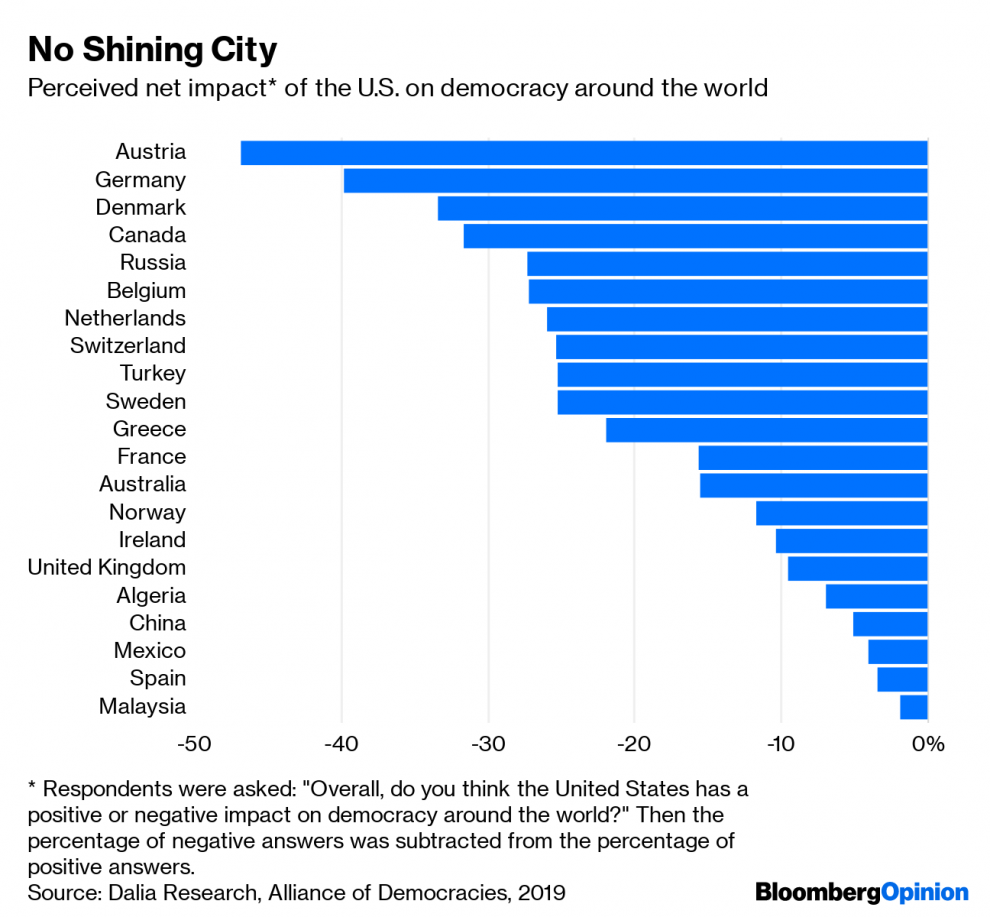
(Bloomberg Opinion) — For decades, freedom and democracy have been part of the U.S. brand. That doesn’t appear to hold true any longer, at least not in established democracies.
A study commissioned by a group founded by Anders Rasmussen, the former Danish prime minister and North Atlantic Treaty Organization secretary general, showed that in many Western nations, U.S. foreign policy and well as two mainstays of its global power – the finance and technology industries – are regarded as threats to democracy.
The group, the Alliance of Democracies Foundation, and Berlin-based Dalia Research, polled 177,870 people in 54 countries about their perceptions of democracy as a concept, its state in their home nations, and in the world in general.
These are timely questions to ask: Influential thinkers, such as Johns Hopkins University professor Yascha Mounk and Cambridge University professor David Runciman have been writing about a crisis of representative democracy. In many countries, people are deeply unhappy with the political class. New technology, climate change and inequality are threatening established political systems.
The Democracy Perception Index, as the Alliance of Democracies and Dalia named their research project, shows that people haven’t lost faith in democratic government – rather, they want more of it. A whopping 79% said democracy was important to have in their country, while 41% said there wasn’t enough of it.
But the research also appears to show that people around the world have widely divergent notions about what it is and who promotes it. To people in 21 of the 54 countries, the U.S. has a negative impact on democracy throughout the world. While these countries include Russia, China and Turkey, where people might be expected to resent America’s global role, most of the 21 are established democracies, and 14 of them have higher scores than the U.S. from Freedom House – the think tank whose data are commonly used as an indicator of how free societies are.
Rasmussen says he would like the study to be “a wake-up call to the U.S. that protectionism and isolationism chip away at the democratic rules-based order that has brought prosperity and peace to our modern world.”
That’s a transparent swipe at Donald Trump’s divisive administration. But data from the survey belie the convenient explanation that the president’s policies are the reason so many people no longer regard the U.S. as the “shining city on the hill,” as Ronald Reagan used to put it.Negative perceptions about the U.S.’s impact are highly correlated with the belief that the finance industry, where the U.S. is the dominant player, hurts democracy. In Italy, France, Germany, Spain and a number of smaller European countries, the sector is seen having a large net negative impact. Of course, the correlation could mean that an increasing number of Europeans view the U.S. as a competitor to the European Union rather than an ally. But it’s more likely that the mistrust earned by the financial industry in the crisis of 2008 is still alive and well. Given the industry’s strong links with the U.S., this will remain a problem long after Trump leaves the White House.
There is a similarly high correlation – close to 0.7 – between those who view the U.S. as a threat to democracy and those who see social networks as a threat. In most countries, the likes of Facebook and Twitter, both U.S. companies, are still seen as net positive influences, but increasingly large minorities are alarmed by these companies’ political impact.
That won’t go away with Trump, either. The link in people’s minds between the U.S. and the so far unbridled aggression of its tech industry is obvious. It can only be broken by a successful regulatory effort to rein in or break up the big social media platforms.
The U.S. doesn’t just have a Trump problem. In much of the Western world – not least in America’s immediate neighbor, Canada, and such staunch allies as Australia and the U.K. – people appear to see a fundamental disconnect between unilateral U.S. leadership and democracy. That, perhaps, is the best indication that the Pax Americana may indeed be ending.
That doesn’t mean, however, that there aren’t still large parts of the world where the U.S. is seen as a beacon of democracy. In 34 of the 55 nations in the Democracy Perception Index, most of them developing countries, the U.S.’s perceived net impact is positive or neutral.
Supporters of the U.S.’s efforts to promote democracy overseas should take heart from that part of the data. Even though countries with strong representative systems of their own have largely grown critical of U.S. democracy, much of the rest of the world is still enthralled by it. There, grateful recipients of American advice and pro-democracy efforts can still be found.
If that trend holds in the post-Trump era, it might be a good reason for the U.S. to seek closer alliances with those countries rather than stick with its traditional, but less appreciative, friends.
To contact the author of this story: Leonid Bershidsky at [email protected]
To contact the editor responsible for this story: Edward Evans at [email protected]
This column does not necessarily reflect the opinion of the editorial board or Bloomberg LP and its owners.
Leonid Bershidsky is Bloomberg Opinion’s Europe columnist. He was the founding editor of the Russian business daily Vedomosti and founded the opinion website Slon.ru.
<p class="canvas-atom canvas-text Mb(1.0em) Mb(0)–sm Mt(0.8em)–sm" type="text" content="For more articles like this, please visit us at bloomberg.com/opinion” data-reactid=”67″>For more articles like this, please visit us at bloomberg.com/opinion
©2019 Bloomberg L.P.







